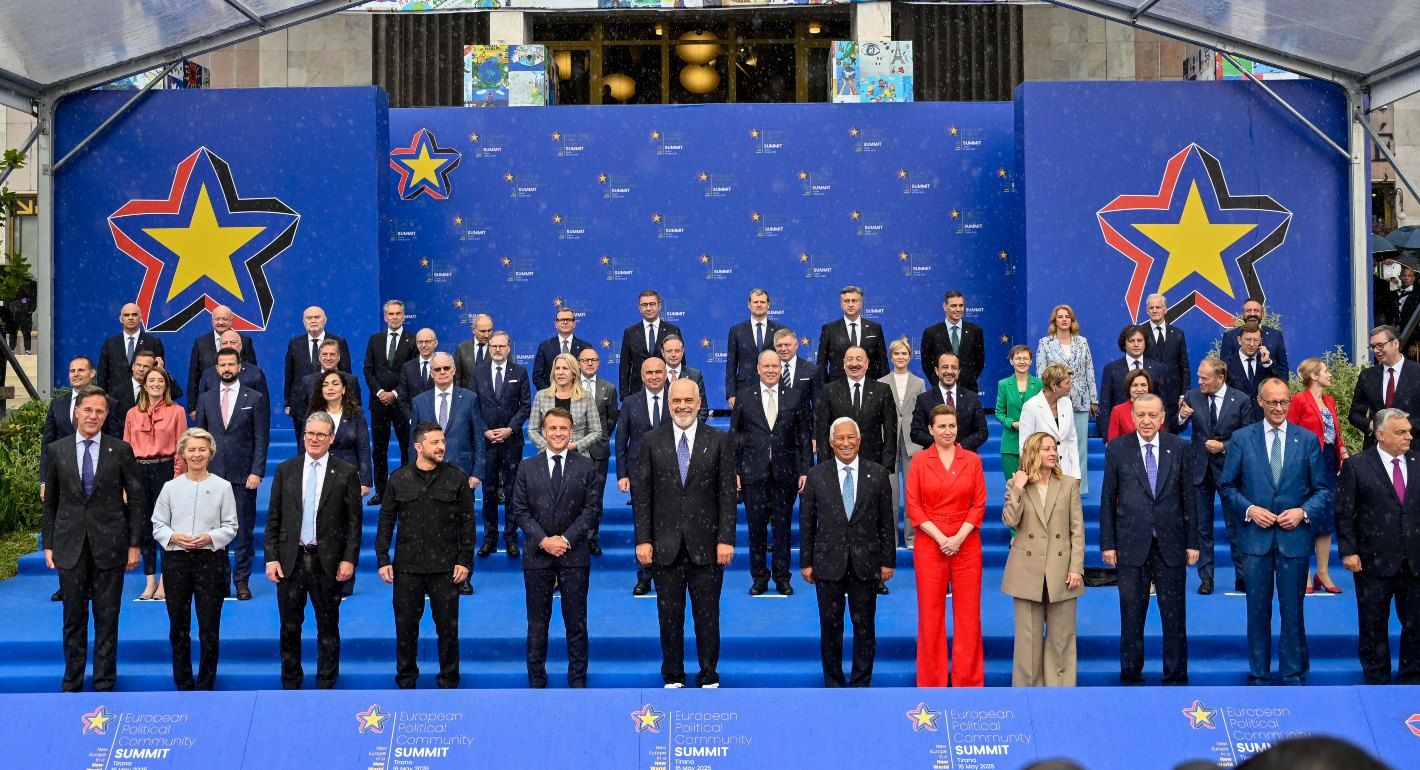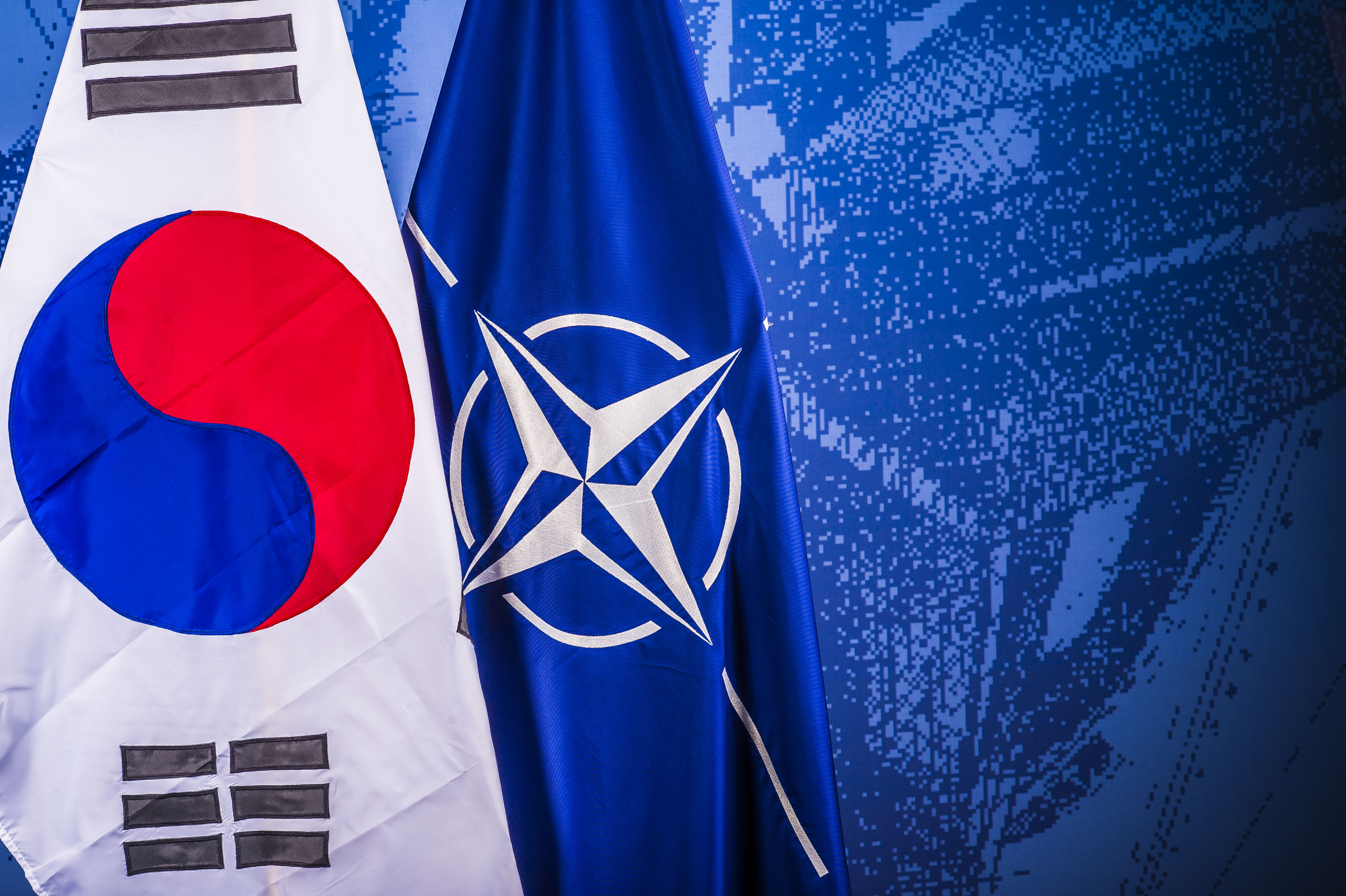The war in Ukraine has revived EU enlargement, but it has certainly not fixed the union’s credibility problem. Elites on the European periphery believe that the bloc is losing influence in global and regional affairs. U.S. President Donald Trump’s attacks on the EU are further eroding the belief that the twenty-seven-strong group can remain united and act with fortitude and resolve in the face of challenges. Whether or not such views are justified, they inform popular attitudes and policy choices.
In response, the EU should refocus its attention on those candidate countries that are making genuine progress toward accession. The union needs to recognize that its neighbors’ political trajectories depend ultimately on domestic decisions, and that EU membership is merely one possible path among many. In an increasingly uncertain world, the lure of the EU can no longer be taken for granted.
A Tale of Two Countries
On November 28, 2024, Georgian Prime Minister Irakli Kobakhidze made a shocking announcement. Georgia was to freeze its bid to join the EU until the end of 2028. Kobakhidze justified the decision by referring to a European Parliament resolution that demanded the previous month’s general election be rerun under international supervision. The vote on October 26 had resulted in the prime minister’s Georgian Dream (GD) party winning an unprecedented fourth term. Yet, alleged electoral fraud on a grand scale cast a shadow over the party’s achievement.
The European Parliament’s call for a repeat election came in response to mass protests against GD in Tbilisi and many other cities. France and Germany likewise pushed for an inquiry into the claims of irregularities. In December, the United States and the UK blacklisted Georgian officials and the tycoon Bidzina Ivanishvili, GD’s behind-the-scenes leader. The EU could not follow suit because Hungary vetoed the proposal, although the three Baltic countries did slap sanctions on some senior Georgian officials.
After months of protests, GD has stuck to its guns. The prime minister is adamant that Georgia will apply for, and eventually achieve, EU membership “on terms that suit the nation’s sovereign values.” Indeed, he believes that the EU will see the light. Georgia plays a “vital role for Europe,” he remarked on May 16 at a summit of the European Political Community (EPC) in Tirana. “Everyone understands the need to engage with Georgia and its leadership, and this is likely why many initiatives have come from European leaders.”
Joining the EU while playing by his own rules could be the motto of Serbian President Aleksandar Vučić, too. Belgrade has been in membership talks with the union since 2014. However, progress has been frustratingly slow. As of May 2025, only two of thirty-five negotiation chapters had been closed provisionally. There is no resolution in sight of the country’s sovereignty dispute with Kosovo, despite a push by the European External Action Service, France, and Germany in recent years. After more than a decade of Vučić rule, major international watchdogs and civil society in the country rank Serbia as a hybrid regime.
Yet, none of that seems to matter since Serbia’s value as a partner to the EU has gone up. Despite Belgrade’s refusal to cut ties with Russia, Serbia has provided defense assistance to Ukraine. Last July at a summit in Belgrade attended by then German chancellor Olaf Scholz, Serbia and the EU signed a memorandum of understanding on critical materials, batteries, and electric vehicles. Partnership à la carte has arguably replaced accession as Serbia’s end goal.
A recent upsurge of popular discontent against Vučić has upset Serbia’s domestic equilibrium and could test the EU’s policy toward the country. An accident at the Novi Sad train station, where a concrete canopy collapsed on November 1, 2024, killing sixteen, sparked a powerful student-led movement that is demanding accountability and restoration of the rule of law. As never before in his tenure, Vučić is on the back foot.
Yet, his strategy is not to clamp down on the protests, as GD has been doing on and off in Georgia. Rather, Vučić is betting on the protests fizzling out—as has happened before in recent years. In April, he appointed a new prime minister, Djuro Macut. An early election could be in the cards, too, if and when the governing Serbian Progressive Party (SNS) feels it has the edge. That is not the case now, and it is the protesters, not the authorities, who are calling for a snap poll. The All-People’s Assembly convened by the SNS in Niš on May 18 aimed to show that Serbian citizens were behind Vučić.
The EU has offered a muted response. Meeting protesting students in Novi Sad on April 30, European Commissioner for Enlargement Marta Kos noted that their demands for accountability and the rule of law aligned with those of the EU. European Commission President Ursula von der Leyen is calling for reforms, too. Yet, EU leaders have not shunned Vučić, much less called for an early election as a way out of the crisis.
For his part, Vučić is testing the waters internationally and domestically. Attending the Victory Day parade in Moscow on May 9 might appear to be a challenge to Europe, but it was more likely meant as a ploy to drive a wedge between liberals and Russia-friendly Serbian nationalists among his critics. Vučić hopes that the EU will stay neutral in the domestic crisis engulfing his country and eventually settle for business as usual. At the EPC summit in Tirana, he spoke of Serbia’s effort “to progress on the European path.”
Not Choosing Europe
The EU’s failure to take Vučić to task explains why protesters in Serbia carry no EU flags, in contrast to their Georgian peers. Serbs see the European leadership as complicit in their government’s state capture and corruption. In Georgia, by contrast, the EU is still viewed as the antidote to bad governance and subservience to Russia.
The contrast highlights what sets Georgia and Serbia apart. Geography is perhaps the most conspicuous difference. Being a direct neighbor of Russia and falling into its sphere of influence is not the same as bordering EU and NATO members, such as Croatia, Romania, Bulgaria, and even Hungary.
However, a common thread connects the two cases. The elites who hold power in Belgrade and Tbilisi—notably, Vučić and Ivanishvili, respectively—are betting against EU membership. Their rhetoric aside, they do not view becoming part of the union as a realistic option. They also think that the price for accession is prohibitively high and therefore not worth paying. In that way, Georgia and Serbia have made a profoundly different choice from other countries in their neighborhoods, such as Montenegro in the Western Balkans and Ukraine in Eastern Europe.
So, what is the choice about, and what motivates it?
The governments in Serbia and Georgia are not fundamentally opposed to Europe in the way that, say, today’s Russia is. On the contrary, they would cherry-pick parts of European integration. Among the aspects they like are access to the European single market and the EU’s territory, including visa-free travel for their citizens, which they secured in 2009 and 2017, respectively. Increased transfers from the EU budget are appealing as well. Serbia is set to receive some €1.6 billion ($1.8 billion) until 2027 from the union’s Growth Plan for the Western Balkans. Free trade with the EU is an incentive for foreign direct investment and boosts exports thanks to tariff-free access—a valuable asset in this era of economic protectionism. Turkey, a major partner for Georgia and increasingly for Serbia, is part of the package, as Ankara aligns its trade policy with the EU’s through the EU-Turkey Customs Union.
What Georgia and Serbia would rather not have is the extra scrutiny into their internal affairs that comes with an EU membership bid. Political conditionality and the direct involvement of EU officials are the two most common forms of such scrutiny. In 2021, European Council President Charles Michel mediated in a crisis in Georgia that pitted the then prime minister, Irakli Garibashvili, against the opposition and antigovernment media. Although the GD administration and the opposition parties involved in the talks eventually reneged on their promises to Brussels, they would not even welcome an external arbiter these days. Similarly, Vučić rebuffed calls for an EU-brokered deal on a technical government to oversee snap elections, on a model first tried in North Macedonia in 2015–2016. In both cases, the regimes saw the EU as a disruptive force that might undermine their stability.
While limiting political exposure to the EU is an overarching priority for both Tbilisi and Belgrade, their tactics differ. GD prefers blunter instruments, such as targeted repression of civil society that aligns with the EU. Vučić, by contrast, seeks to foster cooperation with the union and score points with its leaders while discrediting the EU internally through negative coverage in pro-government media.
Both Belgrade and Tbilisi have also built alliances with Prime Minister Viktor Orbán’s Hungary. Orbán has inspired GD’s culture wars against Western liberalism. The party projects a narrative of an alternative EU based on Christian civilization, which, GD claims, will be much more welcoming to Georgia than the current version of Europe. To quote Kobakhidze, “by 2030, Georgia will become [an] EU member with dignity, respect for Christianity, Church, [and] morals.”
The Hungarian leader has been a champion of Serbia joining the EU, including through Olivér Várhelyi, who served as European commissioner for enlargement in 2019–2024. Orbán has also thrown his weight behind high-profile economic projects, such as the Belgrade–Budapest high-speed railroad, which is backed by China’s Belt and Road Initiative. In much the same way, Georgia has enthusiastically embraced China by signing a free-trade agreement with Beijing and offering the sea port of Anaklia to a Chinese state-owned company. Orbán has also shielded GD from EU sanctions. And he legitimized Georgia’s controversial October 2024 election by visiting Tbilisi twice and claiming to represent the EU as a whole.
Paying lip service to European integration without fully honoring the EU’s demands is part of foreign policy hedging, too. So-called multivectoring is a time-tested strategy in the post-Soviet space to preserve flexibility and, ultimately, domestic stability. Since Russia’s 2022 full-scale invasion of Ukraine, GD has opted to appease Moscow. The government has lambasted its opponents for threatening to drag Georgia into another war with Russia. Tbilisi purposefully eschews anti-Moscow rhetoric. Georgia has also reaped economic benefits from being a route for Western goods into Russia despite the sanctions. In 2023, direct flights between the two countries resumed.
Last but not least, the Georgian parliament adopted a foreign agents law modeled on Russia’s, to the dismay of the EU and the administration of then U.S. president Joe Biden. Serbia has likewise been sitting between two chairs, working with both the West and Russia to score political and economic gains. Interestingly, Belgrade has leveraged domestic woes, too, in charting this course. Depending on his audience, Vučić has blamed both Europe and Russia for fanning protests against him.
This hedging appears to be working, for now. With Trump having changed the tone of the conversation about Russia, Ivanishvili and Vučić feel vindicated. From their perspective, fully joining the West—for example, by imposing sanctions on Moscow—would have generated intolerable costs without delivering much political, let alone economic, gain. “This decision was fundamental,” Kobakhidze said in February 2025 about not adhering to the EU and U.S. policy on Russia. “If Georgia had joined the sanctions, the country would have faced economic destruction.”
The EU’s Credibility Problem
Cherry-picking and hedging are the results of a desire by elites on Europe’s periphery to preserve the status quo. Internally, this desire manifests itself in the form of state capture and the patronage networks that enable it. Externally, it is about maximizing autonomy from geopolitical power centers, including the EU and Russia.
EU enlargement aims at undoing the equilibrium by promoting a level playing field in the economy, underpinned by democratic institutions and the rule of law. However, even in its best days, the policy was hampered by dysfunction. Neither its positive nor its negative incentives are robust enough to achieve its goals to a sufficient degree.
In terms of carrots, EU membership lies, at best, a long way ahead. That is clearly the case for Georgia and, to a lesser extent, for Serbia. Even in the latter case, the problem of relations with Kosovo is a formidable hurdle. Serbia’s leadership believes that if a normalization deal with Prishtina is to be struck, it has to come at the eleventh hour before the country’s accession.
Belgrade points to North Macedonia as a cautionary tale. The country changed its name and constitution to resolve a dispute with neighboring Greece that was much less politically charged than Serbia’s spat with Kosovo, but Skopje is still stuck on its accession track. Vučić and the Belgrade media tell the public in Serbia and, by extension, the entire Western Balkans that the EU is not serious about its offer. Support for membership is lukewarm as a result, as shown by one survey after another. In other words, the EU’s lack of credibility becomes a self-fulfilling prophecy, as Serbia itself is not willing to test the EU’s commitment.
In contrast to Serbia, the public in Georgia is much more EU-friendly. Over 80 percent of Georgians support EU membership, compared with under 40 percent of Serbian citizens. However, that does not imply that Tbilisi is aligned with the EU’s liberal-democratic values. Civilizational bonds—GD’s leitmotif—and the desire to gain a protector against Russia influence popular attitudes. In addition, the EU’s attractiveness should not be conflated with the notion that membership is within reach.
On several occasions, Kobakhidze boasted that Georgia could join the EU by 2030. This deadline is obviously unrealistic. The Georgian government’s showdown with the union suggests that GD is not rushing to meet its own target. Paying lip service to European integration while calling for an overhaul of the EU project to make it compatible with Georgia indicates a lack of credible commitment on the part of Tbilisi.
Anything short of membership—including additional financial support or inclusion in certain EU policies or cooperation formats—is insufficient to alter the political calculus. Why cede power and influence over the judiciary, the media, or public-sector employment or stop harassing the opposition if the payoff does not measure up? More to the point, the staged integration approaches the EU has been experimenting with are the mirror image of cherry-picking. Both sides settle on participation à la carte, while the EU’s holy grail of political conditionality falls by the wayside.
The EU’s sticks are found wanting as well. The union’s inability or unwillingness to apply sanctions to discipline countries on its periphery and their leaders is conspicuous. As mentioned, this shortcoming has to do with disunity in the EU Council. Hungary and other members that share its views are blocking sanctions on governments in candidate countries that defy the EU’s accession conditions. Also at play is crude geopolitical thinking. It is better to keep swing actors, like Georgia and Serbia, close than to push them fully into Russia’s and China’s laps. The overtures by Belgrade and Tbilisi toward Moscow seek, among other things, to raise their respective country’s value in the West.
Since Europe is in no position to either reward or punish, autocratic elites can tailor their relationships according to their needs and preferences.
The Appeal of Nonenlargement
The choice not to pursue EU membership—what might be called the nonenlargement model—has broader appeal beyond Georgia and Serbia. Other countries could follow suit.
In North Macedonia, a government led by the conservative VMRO-DPMNE party has taken a leaf from Vučić’s book. It enjoys cordial relations with Orbán and believes it could build on contacts in Trump’s entourage to drive a bargain with the EU. Membership is not off the agenda, but as in Georgia, there is a proviso that Brussels should be offering better terms.
This involves revising a 2022 compromise with Bulgaria in which North Macedonia agreed to insert a reference to a Bulgarian community into its constitution as a precondition to Sofia allowing Skopje to start accession talks; this is now part of the EU’s common position. Now, Skopje has floated the idea of amending its constitution at the end of the negotiations, or right before joining, rather than at the start. North Macedonian Prime Minister Hristijan Mickoski has requested concessions from Bulgaria in exchange for the amendments, too.
In Moldova, a parliamentary election due on September 28 might lead the pro-EU government of the Party of Action and Solidarity to lose its majority and have to govern in a coalition. A new cabinet could take a more conciliatory line toward Russia and revert to foreign policy hedging. Because of strong economic, political, and societal linkages, the EU would remain a pole of attraction, but reforms needed to move forward in Chişinău’s accession talks would probably stall. At worst, a Georgia-style scenario might ensue.
False Stability
At first glance, nonenlargement is an instrument to cement the political status quo. Illiberal elites use the EU to strengthen their grip on power and blunt Europe’s vaunted transformative influence. However, experience shows that such stability could prove elusive.
Serbian protests have demonstrated that Vučić’s position is not as secure as many believe. His balancing act between the West, Russia, and China has been a necessary but hardly a sufficient condition to maintain regime stability. Serbia’s semiauthoritarian setup has turned out to be ill placed to respond to popular demands for safety, the rule of law, and accountability. Support or neglect from the EU might provide wiggle room to the current Serbian government but will not fix the legitimacy deficit it faces. The EU cannot decide whom voters elect and who gets to run Serbia. But by the same token, it is not up to European politicians and officials whether Vučić survives in power. Once the domestic tide turns against him, he will not be bailed out by Brussels, Berlin, or Paris.
Georgia illustrates another problem with the nonenlargement model. In societies where the EU commands a vast amount of popularity, any turn away from European integration deepens internal polarization. That is especially true in times of geopolitical competition, such as now, when Russia’s bid to reassert its influence over its near abroad is at a historic high.
Ukraine’s 2013–2014 Revolution of Dignity is a prime example in that regard. Since its independence, Ukraine had excelled at multivectoring, hedging, and selective integration into the EU. Ultimately, however, this strategic choice backfired. Russia raised the stakes, while the governing elites lost their internal legitimacy. Former Ukrainian president Viktor Yanukovych’s refusal in late 2013 to sign an association agreement with the EU under pressure from the Kremlin was the original trigger for the protests that led to his downfall. A sharp turn in Moldova may result in a domestic crisis there, too.
These risks speak to a challenge the EU faces. Enlargement is difficult to execute for political, economic, and social reasons. However, nonenlargement generates its own risks and costs. As a result, the EU and its member states get drawn in. Managing this dilemma is likely to remain a prime task for European decisionmakers.
What Is to Be Done?
When it comes to the EU’s ability to act with conviction and in unison, the onus is on Europe to prove the skeptics wrong. Ukraine is probably the critical piece in this conversation. How successfully Europe, including the UK, handles Ukraine will have subsequent effects on EU enlargement policy. A failure to provide effective diplomatic, economic, and political support will deal a heavy blow to the EU’s credibility. More foreign policy hedging will follow, adding to democratic erosion in domestic affairs.
The EU has to reconcile itself to the fact that riding several horses is the norm in a multipolar global system defined by uncertainty. Even if enlargement accelerates and one or two countries make it into the union by the early 2030s, Europeanization will not be the only game in town. Relations with other centers of power, such as China, Turkey, the Gulf states, and even a revisionist Russia, will remain important for EU candidate countries and new members.
The EU should present enlargement as an offer, not an inevitability. If countries such as Georgia and Serbia choose to stay outside the union rather than comply with its cumbersome political conditions, the EU should challenge them to state their decision explicitly. A nonmembership trajectory would not mean political or economic decoupling. Norway, the UK, and Turkey are outside the EU but have varying degrees of access to the bloc’s markets and even its institutions.
Whether a country decides to run the extra mile and pursue EU membership is a function of internal decisionmaking, not something that can be imposed by dreaded Eurocrats. The EU should adjust its discourse accordingly: Candidate countries have a choice, and membership is only one option on the menu. Of course, countries like Georgia and Serbia can change over time and recommit. But in the meantime, the EU should devote its limited resources to those candidates that are fulfilling its conditions.
The EU also needs to become more flexible, both internally and externally. The all-or-nothing approach to participating in the internal market is obsolete. The EU’s recent agreements with Switzerland already deviate from this model. The UK might end up with a bespoke arrangement as well. The EU should allow countries that do not want to be members to participate in EU policies such as transportation or energy where interests overlap. If this form of cooperation works well, it could serve as a springboard to eventual accession. Equally, nondemocratic countries should not be awarded with access to EU privileges without reciprocal concessions. “More for more,” the guiding principle of the European Neighborhood Policy in the early 2010s, should also be a cornerstone for enlargement.
If countries like Albania and Montenegro eventually join the EU, it should use them as examples for others to emulate. Whether they are positive role models will depend on their economic performance and the improvement of their institutions and the rule of law. The EU should use its instruments to prevent democratic backsliding after candidates accede to safeguard the union’s founding narrative.
The author gives special thanks to the ERSTE Foundation for supporting this article and to the participants of the workshop hosted by the Institute for Human Sciences (IWM) in Vienna on May 7, 2025. The views expressed in this article are solely those of the author.













